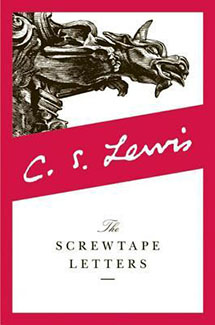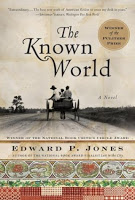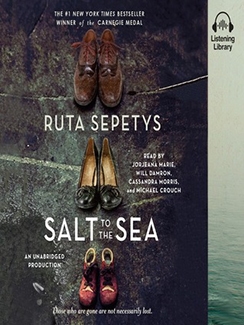I have affiliate relationships with Bookshop.org and Malaprop's Bookstore in beautiful Asheville, NC. I will earn a small commission at no additional cost to you if you purchase merchandise through links on my site. Read more on my affiliate page.

Title: The Screwtape Letters
Author: C. S. Lewis
Genre: Spirituality, Classics, Epistolary
Audience: Adult
My Review:
The Screwtape Letters is honestly not the kind of book I would choose on my own but it filled a reading challenge prompt, I love Narnia, and one of my old bosses recommended it to me years ago. So read my review with that in mind.
This just was not the book for me. I’m a fast reader and simply cannot bring myself to slow down and give philosophical/spiritual books the thought and attention they require. There’s also not much of a narrative arc to drive this very spare plot forward. I like plots. A lot.
Screwtape is a demon writing letters to his young nephew, Wormwood, advising him as to how best win a human soul over for “Our Father Below.” I can be surprisingly literal-minded for someone who adores all things fantasy so I had a very hard time as a Christian wrapping my head around the backwardness required to see Lewis’s point with this book. To me, “Our Father” means God and “The Enemy” is Satan. I constantly tripped over this reversal in the book. So there was this constant, “What? Our Father doesn’t want us to be greedy. No, wait. ‘Our Father’ in the book means Satan and Lewis is saying that Satan wants us to be greedy so if we want to be good Christians we should not be greedy.” My brain made it much more complicated than it was supposed to be but I couldn’t find a way to adjust my thinking.
“The parochial organisation should always be attacked, because, being a unity of place and not of likings, it brings people of different classes and psychology together in the kind of unity the Enemy desires. The congregational principle, on the other hand, makes each church into a kind of club, and finally, if all goes well, into a coterie or faction.”
Churches in America today seem to be splintering more and more along political lines. This quote, written around 1941, seems, to me, to address that.
“The figures in the popular art are falsely drawn; the real women in bathing suits or tights are actually pinched in and propped up to make them appear firmer and more slender and more boyish than nature allows a full-grown woman to be…. As a result we are more and more directing the desires of men to something which does not exist–making the rôle of the eye in sexuality more and more important and at the same time making its demands more and more impossible.”
Photoshopping women into impossible dimensions was a problem even before Photoshop existed.
“Cruel ages are put on their guard against Sentimentality, feckless and idle ones against Respectability, lecherous ones against Puritanism; and whenever all men are really hastening to be slaves or tyrants we make Liberalism the prime bogey.”
So this wasn’t the book for me but if your brain is more flexible than mine and you enjoy philosophical and/or spiritual books, go ahead and give it a try.
Synopsis from GoodReads:
The Screwtape Letters by C.S. Lewis is a classic masterpiece of religious satire that entertains readers with its sly and ironic portrayal of human life and foibles from the vantage point of Screwtape, a highly placed assistant to “Our Father Below.” At once wildly comic, deadly serious, and strikingly original, C.S. Lewis’s The Screwtape Letters is the most engaging account of temptation—and triumph over it—ever written.
Reading Challenge:
Purchase:
Buy The Screwtape Letters from Malaprop’s Bookstore in beautiful Asheville, NC or







10 Comments
Too bad this didn’t work for you. This book is so rich, and its social analysis still applies so well to our current society!
You are right, this is not a book to read fast, this could be a good book to read with someone else, a chapter at a time, and think and discuss
I agree that it would be a good group read. At least that might get me to slow down and take my time with it.
I’ve heard of The Screwtape Letters, but I’ve never actually considered reading it. (I still am not planning to.) I have generally not had much luck enjoying overly Christian fiction—whether meant as commentary or not—and so I tend to avoid it.
I rarely read it but needed a book by “an Inkling author” for a challenge last year. The only two I was familiar with from the group are Tolkien and Lewis. Since I vastly prefer Narnia to LOTR, I went this direction. I should have steered for Middle Earth instead.
Way, way back when I was teen, our Sunday School teachers (a married couple) read a chapter a week to us from this book, and then we discussed it. We were near the end of the book when the man of the couple disappeared, and we later learned he had left his wife and run off with their foreign exchange student. So this book is always connected in my mind to that time.
Holy moly. What a scandal. And what a number of hurt and betrayed people it must have left in its wake. At least I understood Lewis’s points better than the one Sunday School teacher did.
We read through this one with out youth group. I also have a hard time with really philosophical books.
I’m curious what the young people thought of it. I might have done better with a group discussion but I really couldn’t wrap my brain around it as a solo read.
Hi Jen!
I am also a huge Narnia fan, but I haven’t read Screwtape letters yet. My husband has read it though and he enjoyed it.
But I am very much the same as you – fast reader and just don’t have the time and patience for highly philosophical reads at the moment. Maybe I should buy a physical copy and keep it next to my bed and read it every now and then…
Loved your honest review!
Reading it as you feel like it and you have time would be the perfect approach. Having a time limit on a library checkout was not great for me, when I read fast anyway.